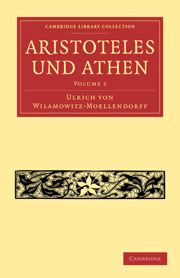Book contents
- Frontmatter
- Contents
- ZWEITES BUCH. Untersuchungen auf grund der aristotelischen Politie
- 1 Die quellen der griechischen geschichte
- 2 Die athenische politie von Kekrops bis Solon
- 3 Die athenische politie von Peisistratos bis Ephialtes
- 4 Πάτϱιoς πολιτεία
- 5 Die könige von Athen
- 6 Trittyen und Demen
- 7 Der athenische name
- 8 Der Areopag vor Ephialtes
- 9 3000 hopliten von Acharnai
- 10 Diobelie
- 11 Tιμήματα παρεχόμενοι
- 12 Λόγος und εὔϑυνα
- 13 Προχειροτovία
- DRITTES BUCH. Beilagen
- Sachregister
10 - Diobelie
Published online by Cambridge University Press: 10 November 2010
- Frontmatter
- Contents
- ZWEITES BUCH. Untersuchungen auf grund der aristotelischen Politie
- 1 Die quellen der griechischen geschichte
- 2 Die athenische politie von Kekrops bis Solon
- 3 Die athenische politie von Peisistratos bis Ephialtes
- 4 Πάτϱιoς πολιτεία
- 5 Die könige von Athen
- 6 Trittyen und Demen
- 7 Der athenische name
- 8 Der Areopag vor Ephialtes
- 9 3000 hopliten von Acharnai
- 10 Diobelie
- 11 Tιμήματα παρεχόμενοι
- 12 Λόγος und εὔϑυνα
- 13 Προχειροτovία
- DRITTES BUCH. Beilagen
- Sachregister
Summary
Die institution der diobelie), die diesen festen namen führt, ist durch Kleophon eingeführt; das sagt Aristoteles 28, 3 und damit sind ihre antiken und modernen deutungen auf den richtersold oder die schaugelder beseitigt, sintemal diese längst bestanden: es ist nur ein beweis für die macht des trägheitsgesetzes, dass sie selbst zur erklärung des Aristoteles weiter vorgebracht werden.
Für die diobelie begegnen uns bedeutende zahlungen in der schuldurkunde aus dem jahre des Glaukippos 410/9 und einem der folgenden 408/7 oder 407/6 (CIA I 188, 189); das geld ist von den schatzmeistern der göttin an die hellenotamien gezahlt. die posten sind zum teile sehr niedrig, dann wird aber fast täglich der schatz in anspruch genommen,) für die verteilung des geldes gab es eine behörde, denn Xenophon Hell. I 7, 2 nennt den Archedemos τоῦ δημоν πϱоεστηϰως ϰαι τῆς διω βελιας ἐπιμελоμενоς. aber der ausdruck fübrt auf ein collegium von ἐπιμεληται, das wir der weise des fünften jahrhunderts entsprechend nicht über den beamten stehend denken dürfen wie im vierten die ἐπι τῷ θεωϱιϰῷ, sondern unter ihnen, also nicht befugt, selbst das geld aus dem schatze zu entleihen. aber der erste demagoge (τα πϱῶτα τῆς ἐϰεῖμоϰθηϱιας, sagen die seligen der Frösche von Archedemos 418), ein mann, der sich von Kriton gegen tantième zum schutze seines vermögens vor den sykophanten anstellen liess (Xen. Memor. II 3), bekleidete doch dieses amt, in dem wir also Kleophon und Kallikrates auch denken müssen.
- Type
- Chapter
- Information
- Aristoteles und Athen , pp. 212 - 216Publisher: Cambridge University PressPrint publication year: 2010First published in: 1893



